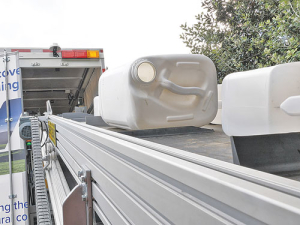Government approves nationwide recycling scheme for primary sector plastics
Rural recycling scheme Agrecovery is welcoming the Government's approval of regulations for a nationwide rural recycling scheme for agrichemicals and farm plastics.
 Agrecovery has designed the scheme to include a phased approach to encompassing a broader range of materials over time.
Agrecovery has designed the scheme to include a phased approach to encompassing a broader range of materials over time.
Farm plastic recycler, Agrecovery’s Green-farms Product Stewardship Scheme (GPSS) has been officially accredited under the Waste Minimisation Act (2008).
The GPSS is designed to tackle the challenge of farm plastic waste head-on, with a focus on four primary farm plastics waste streams in the first 3 years of the scheme being in effect: agrichemical containers, bale wrap and silage sheets, small seed and feed bags, and large 1T and 500kg fertiliser sacks. The GPSS has also been accredited to incorporate Animal Health and Household Pest and Weed plastic packaging.
Agrecovery board chair Anders Crofoot says receiving the accreditation is a testament to the hard work and commitment of its team, stakeholders, and the agricultural community.
“Together, we are setting a new standard for environmental responsibility, ensuring that our actions today pave the way for a more sustainable tomorrow.”
“New Zealand dairy farmers are committed to reducing their environmental footprint, including minimising plastic waste. The GPSS offers a solution to enable our farmers to progress further along this journey,” says Burger.
Agrecovery has designed the scheme to include a phased approach to encompassing a broader range of materials over time with plans to significantly broaden the range of recyclable plastics covered by the GPSS in the next 2-7 years. This expansion is a response to the feedback from the farming community and an acknowledgment of the evolving needs of the agricultural sector.
Agrecovery chief executive Tony Wilson says that this is a landmark achievement not only for Agrecovery but for the entire New Zealand primary industry.
“Our accredited GPSS underscores our dedication to stewardship and sustainable practices, driven by the demands and cooperation of New Zealand’s farmers and growers. We’re looking forward to expanding our schemes and fostering innovation and collaboration to ensure a sustainable future for all.”
The GPSS will operate as a voluntary scheme until regulations are in place to ensure all producers of the targeted products participate.
Regulations proposed by the industry-led scheme co-design process to support the GPSS would require those selling the targeted products paying levies to enable a free nationwide collection network for farmers and growers.
Global trade has been thrown into another bout of uncertainty following the overnight ruling by US Supreme Court, striking down President Donald Trump's decision to impose additional tariffs on trading partners.
Controls on the movement of fruit and vegetables in the Auckland suburb of Mt Roskill have been lifted.
Fonterra farmer shareholders and unit holders are in line for another payment in April.
Farmers are being encouraged to take a closer look at the refrigerants running inside their on-farm systems, as international and domestic pressure continues to build on high global warming potential (GWP) 400-series refrigerants.
As expected, Fonterra has lifted its 2025-26 forecast farmgate milk price mid-point to $9.50/kgMS.
Bovonic says a return on investment study has found its automated mastitis detection technology, QuadSense, is delivering financial, labour, and animal-health benefits on New Zealand dairy farms worth an estimated $29,547 per season.
OPINION: Staying with politics, with less than nine months to go before the general elections, there’s confusion in the Labour…
OPINION: Winston Peters' tirade against the free trade deal stitched with India may not be all political posturing by the…